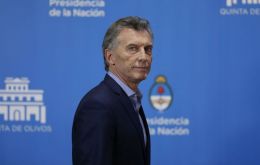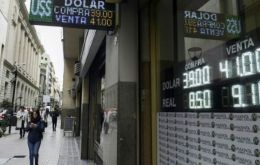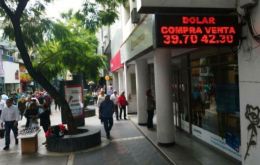MercoPress. South Atlantic News Agency
Tag: IMF
-
Wednesday, April 24th 2019 - 09:15 UTC
IMF also concerned with the increase in the poverty rate in Argentina

An official with the International Monetary Fund has declared that the increase in the poverty rate in Argentina could force the government to rethink its spending plans and “protect the poor.”
-
Thursday, April 18th 2019 - 09:44 UTC
Macri announces freeze in the price of basic goods and in public services

Argentina's President Mauricio Macri announced a freeze in the price of basic goods and public services on Wednesday in a bid to limit the impact of spiraling inflation that could hamper his re-election hopes in October. Hit by soaring prices due to inflation that reached almost 55% over the last 12 months, many Argentines have been calling for a change in economic policy.
-
Wednesday, April 17th 2019 - 09:58 UTC
Argentina's inflation 54.7% in 12-months; more monetary “contraction measures” and support from IMF

Argentina's inflation rate accelerated for the third straight month in March, the government statistics agency said on Tuesday, prompting the central bank to unveil fresh measures to temper raging inflation and protect the embattled peso currency.
-
Friday, April 12th 2019 - 09:28 UTC
IMF's Lagarde glad a chaotic Brexit was avoided but warns about a prolonged uncertainty impact

Further uncertainty over Brexit will hinder growth in the UK economy, the head of IMF has told the BBC. Speaking ahead of the agreement of an extension to Article 50, Christine Lagarde warned that businesses and investors will remain hesitant in the coming months. She said any prolonged uncertainty would have a “negative impact”.
-
Wednesday, April 10th 2019 - 09:58 UTC
“My trade wars aren't finished yet”, Trump warns IMF and World Bank spring meetings

United States president Donald Trump is sending a clear message to the economic policymakers gathering in Washington for the IMF and World Bank's spring meetings: My trade wars aren't finished yet and a weakening global economy will just have to deal with it.
-
Wednesday, April 10th 2019 - 09:19 UTC
IMF cuts global 2019 growth; suggests rich countries should prop their economies

The International Monetary Fund on Tuesday cut its global economic growth forecasts for 2019 and warned growth could slow further due to trade tensions and a potentially disorderly British exit from the European Union.
-
Tuesday, April 9th 2019 - 09:59 UTC
Argentina's Peso takes a rest after a hectic week but the country risk shoots to its highest this year

Latin American stocks were flat on Monday, partly subdued by delays in important pension reform in Brazil, while currencies in the region rose against a weak dollar but Argentina's peso hovered around record-low levels on political uncertainty and the highest country risk so far this year.
-
Saturday, April 6th 2019 - 09:33 UTC
IMF releases US$10.8 billion to Argentina and insists on fiscal prudence

The Executive Board of the International Monetary Fund (IMF) completed on Friday the third review of Argentina’s economic performance under the 36-month Stand-By Arrangement (SBA) that was approved on June 20, 2018. The completion of the review allows the authorities to draw the equivalent of SDR 7.8 billion (about US$10.8 billion), bringing total purchases since June 2018 to SDR 28.01371 billion (about US$38.9 billion).
-
Friday, April 5th 2019 - 09:26 UTC
Argentines take to the streets under pouring rain to protest Macri’s austerity

Argentine unions, small business owners and activists took to the rain-drenched streets of Buenos Aires on Thursday to protest against austerity measures under President Mauricio Macri, which they blame for amplifying worker hardships and sapping growth.
-
Saturday, March 16th 2019 - 10:15 UTC
IMF prepared to help Argentina stabilize exchange market volatility in election year

Argentina’s central bank wants to license market makers to help stabilize its embattled peso currency when the Treasury starts newly announced dollar sales in April. The bank hopes the market makers, dealers who agree to buy and sell at set prices, would bolster liquidity in the exchange market to help avoid the sharp gyrations the peso has suffered in recent weeks when it hit a record low of 42.5 pesos per dollar in thin trading.
